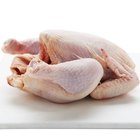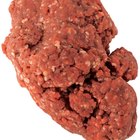
You should not eat spoiled chicken, even if you boil it. When your chicken goes bad, it will have an unpleasant odor, sticky texture and may have visible mold on the outside of the meat. While boiling chicken does kill some bacteria, it won't kill all of them or the toxins they produce.
Step Away
Raw chicken only stays safe for one to two days if properly refrigerated at below 40 degrees Fahrenheit and one year if frozen at 0 F. Chicken that has been cooked to an internal temperature of 165 F lasts for up to one week in the fridge. If your chicken sits out for one to two hours at temperatures between 40 and 140 F, it will spoil. The problem that spoiled chicken poses is the bacteria that grow and multiply quickly within it, which can cause foodborne illness.
The Tough Bacteria
Some dangerous bacteria like Escherichia coli -- nicknamed E. coli -- and Salmonella are killed by heating or boiling it until the internal temperature reaches 165 F. Others, like Staphylococcus aureus, produce toxins that are unaffected by heat. Clostridium bacteria can produce a heat-resistant spore that still leaves the chicken contaminated. These microorganisms make eating spoiled chicken, even if boiled, dangerous, and will also make it taste bad. Throw away any meat that you're unsure of or that has been out on the counter too long.
Related Articles

If Chicken Smells Bad Can You Still ...

Can I Cook Chicken That's Been Thawed ...

Can I Cook a Chicken Five Days After ...

How to Defrost a Chicken in a ...

How to Re-Crisp a Cold Roast Chicken

How Long Can Chicken Stay Out Without ...

Can I Boil Ground Chicken?

What Happens to Boneless Chicken if I ...

Can I Stop Cooking a Chicken Halfway & ...

What Does Spoiled Meat Smell Like When ...

Do You Need to Boil Sausage Before ...

How to Slow Cook Chicken With Tomatoes ...

How to Cook a Baked Panko Chicken Liver

How to Boil Conch in the Shell

Can I Cook a Whole Chicken Without ...

How to Cook Chicken Bratwurst

Dangers of Spoiled Ground Beef

How Long Do You Need to Boil Large ...

How Fast Does Cooked Spaghetti Squash ...

Can You Cold Smoke Chicken?
References
- U.S. Food and Drug Administration: Bad Bug Book: Foodborne Pathogenic Microorganisms and Natural Toxins Handbook Staphylococcus aureus
- FoodSafety.gov: Food Safety Myths Exposed
- Texas A&M AgriLife Extension: Bacterial Food Poisoning
- Ask Karen: What Are Spoilage Bacteria?
- EatByDate: How Long Does Chicken Last?
- U.S. Department of Agriculture Food Safety and Inspection Service: "Danger Zone" (40 F - 140 F)
Writer Bio
Based in Las Vegas, Susan Paretts has been writing since 1998. She writes about many subjects including pets, finances, crafts, food, home improvement, shopping and going green. Her articles, short stories and reviews have appeared on City National Bank's website and on The Noseprint. Paretts holds a Master of Professional Writing from the University of Southern California.
Photo Credits
Pixland/Pixland/Getty Images